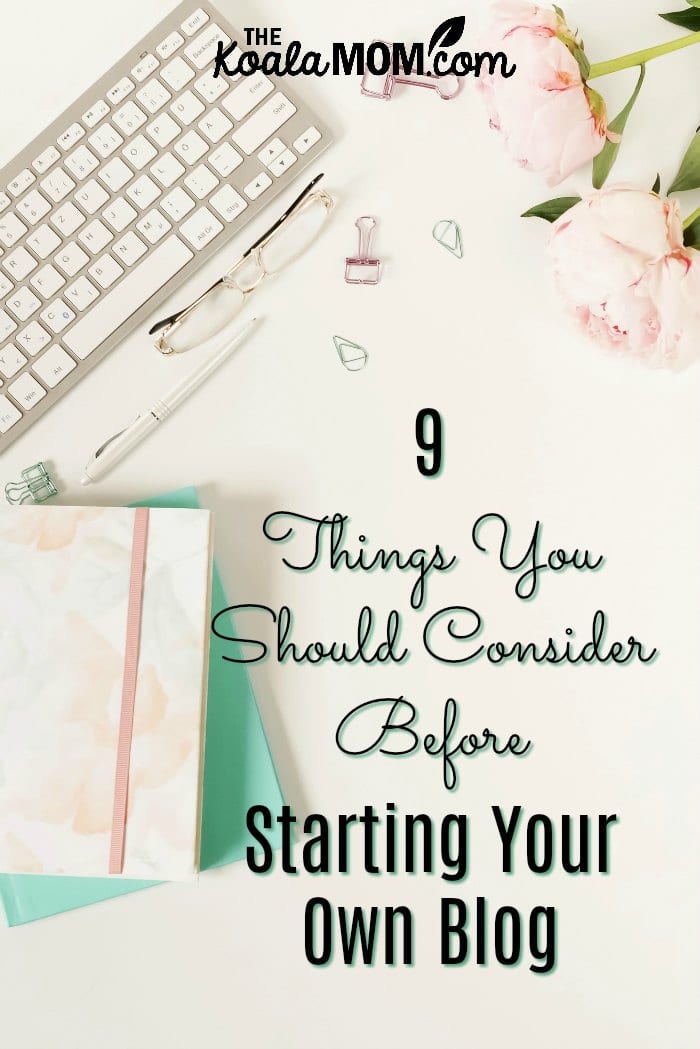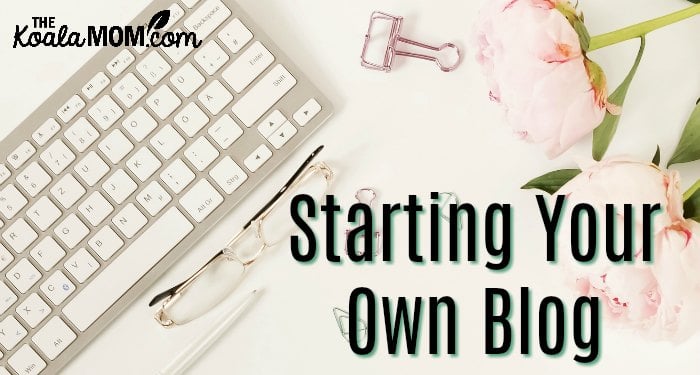Blogging is fun and profitable, but very demanding. As a new blogger, you must have determination and commitment to build up a well-designed blog. You’ll need to find blog topics of great interest to your intended readers, or sell products that meet specific needs for your customers. Here are 9 essential things you should know before starting your own blog.

This post contains affiliate links; as an affiliate, I earn from qualifying purchases.
1. Why Are You Doing This?
There are many responsibilities that come with blogging, so think about why this appeals to you. Analyze your current job situation (if you are hoping to earn an income from blogging). If you are satisfied with your status quo, don’t change it only because “blogging is cool,” and you’ve heard that it brings good money.
Ask yourself:
- What do I want out of this?
- Why am I struggling to get started?
- Will I have the strength to continue even when bumping into obstacles?
- Do I want it enough?
- And most importantly, why do I want to blog?
Make sure you find compelling arguments behind your reasoning for starting your own blog. If “money” is the only answer you can come up with, you might want to rethink your decision.
For example, Gary Vaynerchuk, a charming New Yorker, has dedicated his life to hosting a Wine Library TV show, which is a very popular video blog. Had he not been passionate about wine in the first place, he says, he wouldn’t have started at all.
2. What Are You Good At?
The number one rule of blogging is writing about your passions and interests. If you’re considering starting your own health blog but have no interest in healthy living whatsoever, stop right there. Don’t do it if you are not passionate enough. Find other interests that might fit you better.
If you build content on topics uninteresting to you, there’s a high chance you’ll get bored easily. Once you get bored, blogging becomes a punishment rather than an enjoyable activity. Even if starting your own blog can be challenging, it should never be considered a burden. Do what you love and you’ll attract readers who also love the same things.
Finding your niche could take some time, and that is okay. Ask yourself, “What do people want to read about?” and then “what would I enjoy writing about?” Finding a balance between the two is the perfect match.
However, you should analyze the market, and figure out what people want to read about. There are some popular topics you should look into. They bring in profits, and expand your business quickly. Maybe you’ll find your passion among these ideas:
- Teaching people how to make money online (I am teaching you this right now, am I not?)
- Working out
- Eating out/food
- The beauty industry
- Traveling and other lifestyle niches (e.g., gardening, survival, leading)
- Personal and career development
Saw something you might get into? Then get started on it!
3. What’s the Foundation of a Successful Blog?
Everybody asks me the same question, yet people never seem to hear what they want. Entrepreneurs and business owners want quick results, while passionate bloggers want increased traffic – and that is perfectly normal. But in order to develop and act efficiently, you must lay a strong foundation. So, how do you do that?
Quality content! I always say that! Quality content! Focus on quality content first. If you are a beginner, let go of hacks or tricks on how to win an audience. You need to build good content first. That’s the fastest route to success.
4. Should You Invest?
Of course you should invest, but smartly. Spending money before earning any is a strategic tactic. The first step you’ll need to take is looking for advice or recommendations from experienced bloggers.
If you’re not an expert in this field, read what other bloggers have to say about it. Consult with a friend or fellow blogger who is willing to mentor new bloggers. Planning your business on your own can be too much to handle, so why jeopardize your chances? Success comes with calculated risks and clever actions.
5. Self-host or free host?
Let’s start by defining both of the terms. Self-hosting means owning your own blog, and paying for it. The benefits of self-hosting your blog are:
- Having the freedom to personalize your blog the way you want to
- Promoting as much content as you want
- Running ads on your website
- Finding sponsors and doing product reviews
On the other hand, free hosting won’t cost you anything to start with. The cons, however, are numerous:
- You will have the host’s domain name attached to yours
- Your blog will look less professional
- Hosts can delete or edit your content whenever they want to, and however they want to
- Your resources are limited (video, images, memory)
- You don’t have the freedom to optimize the blog as you want, or personalize it accordingly
Self-hosting is like buying your home, while free hosting is like renting your home. I’d personally choose to self-host, but it really depends on where your budget is. If it’s tight, don’t worry about it – traffic will still come if you have quality content.
6. How About the Platform?
Choosing a platform is another important part of the process of starting your own blog. As a beginner, you’ll probably want to choose a platform that is easy to work with and does not require coding. The best ones at this moment are WordPress (self-hosted) and Blogger (free hosting).
Carrie Melvin, Sales Manager at AustralianEssays, shares her opinion: “As your blog expands, you should look into adding extra quality characteristics and improving your blog’s features. That means choosing a platform that’s easy to understand flexible in the first place! Do your research well, and see which platform suits your website’s present and future needs. Think in prospective.”
7. Did You Choose a Domain?
If you didn’t, here are some tips on how to choose a domain name properly:
- Choose the “.com” extension (or “.ca” if you’re in Canada and targeting a Canadian audience)
- Use multiple keywords in your domain for promotional purposes and better rankings on Google
- Keep your domain’s name brief, but strong
- Make it original
- Don’t use hyphens
- Don’t use double letters – you might lose traffic
Think everything through behind making such an important decision for your blog, and stay positive about it!

8. How Will Your Bring in the Traffic?
You might know the answer to this question by now, but I’ll emphasize it again, to make sure you got it: quality content. Now, how do you create quality content?
- Be original; don’t copy what others have already written. Google’s algorithms will detect your lack of originality and shut down your blog
- Choose powerful headlines that stick out
- Meet needs, provide answers to relevant questions
- Cite, relate back to your website, be accurate in your statements and facts
- Add images and video for customers’ better understanding of the topic
- Be brief in your explanations, but expand on what is important
- Keep updating content regularly
Bringing traffic to your blog by creating good content is the best marketing strategy there is.
9. Should You Continue?
Start writing, track your progress, and notice where your blog is headed. If you are already seeing an increase in customers and feel good about your progress, invest even more. Take even more calculated risks! Be even more active.
If, however, your blog is not heading in the direction you wanted it to, rethink your ideas, and reanalyze your niche. There’s no shame in that!
What factors did you consider before starting your own blog? Or are you still thinking about starting a blog?
Howard Robson is a blogger from Melbourne. He enjoys traveling, photography, computer games and meeting new people.

No Responses Yet